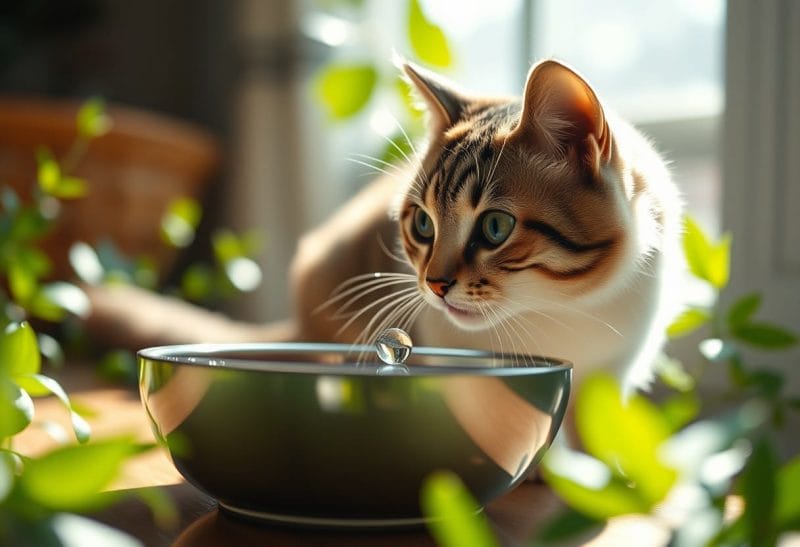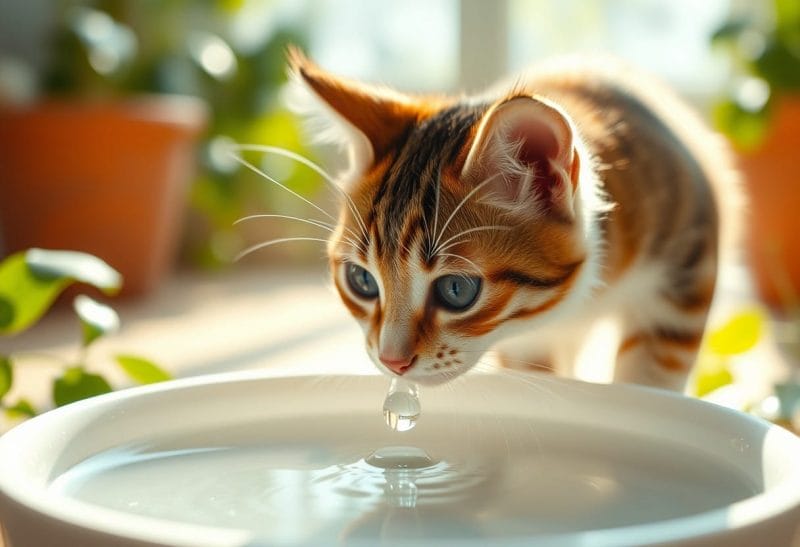With proper hydration being vital for your cat’s overall health, understanding the importance of water in their diet is imperative. You may wonder how much water your feline friend needs and how it affects their well-being. This blog post will probe into the significance of water for cats, discussing hydration needs, tips for encouraging your cat to drink, and the potential consequences of dehydration. By ensuring your cat stays well-hydrated, you can help promote a longer, healthier life for your furry companion.

Key Takeaways:
- Hydration: Adequate water intake is necessary for a cat’s overall health and well-being.
- Kidney function: Proper hydration helps maintain optimal kidney function and reduces the risk of urinary tract issues.
- Encouraging drinking: Providing fresh and clean water encourages cats to drink more, which is beneficial for their health.

The Importance of Hydration in Cats
To ensure your cat remains healthy, proper hydration is necessary. Cats, like humans, rely on water to support critical bodily functions. Hydration plays a significant role in maintaining organ function, aiding in digestive processes, and helping regulate body temperature. Without adequate water intake, your cat may struggle with various health issues, making it vital to prioritize their hydration needs.
Why Cats Need Water
After adequate hydration helps maintain your cat’s overall health, impacting everything from organ function to digestive efficiency. Water enables necessary bodily processes, assisting in nutrient absorption and waste elimination. Moreover, it aids in thermoregulation, ensuring your cat can maintain a stable body temperature, particularly during hot weather or after physical activity.
Signs of Dehydration
After observing your cat’s behavior and physical condition, look for signs of dehydration, as they can indicate insufficient water intake. Common symptoms include lethargy, dry gums, and decreased urine output or concentrated urine. If you notice these signs, it’s important to address your cat’s hydration quickly to prevent potential health problems.
And keep a close eye on your cat for further indicators of dehydration, such as a loss of skin elasticity and increased thirst. You might also notice a decrease in appetite or changes in their energy levels. Monitoring these signs will allow you to take proactive steps to maintain your cat’s hydration and overall health, ensuring they lead a happy, comfortable life.
Sources of Water for Cats
Some of the best sources of water for your cats come from both drinking water and moisture-rich food. Ensuring that your feline friends have access to fresh, clean water daily is vital for their hydration and overall health. With various options available, such as ceramic, stainless steel, or automatic water fountains, you can find the perfect bowl that suits your cat’s preference and encourages them to drink more. Regularly changing the water and keeping the bowl clean will play a significant role in promoting hydration and preventing any health issues.
Drinking Water
Before providing water for your cat, consider the various types of water bowls available. Automatic water fountains can entice your cat to drink more through the movement of water, while ceramic or stainless steel bowls provide a stylish and hygienic option. The key is to offer clean, fresh water daily, as stagnant or dirty water can deter your cat from drinking and may even pose health risks.
Moisture in Food
One effective way to enhance your cat’s hydration is through wet food, which has a significantly higher moisture content compared to dry food. This can be beneficial, especially for cats that are not avid drinkers. Incorporating wet food into their diet can help maintain optimal hydration levels. (Making the choice between wet and dry food can have a lasting impact on your cat’s hydration.)
Sources of hydration for your cat can come from a balanced diet that includes moisture-rich food. Not only does wet food provide crucial nutrients, but it also helps ensure your cat stays hydrated even if they aren’t drinking enough water. For cats prone to urinary issues, choosing wet food may offer added preventive benefits. (Having a proper balance between wet and dry food can significantly influence your cat’s meals and hydration.)
How Much Water Do Cats Need?
Keep in mind that proper hydration is vital for your cat’s health. It’s recommended that you ensure your feline drinks enough water daily. For more insight, check out Reasons Why Your Cat Should Drink More Water to understand the importance of adequate hydration.
Daily Water Intake Recommendations
Below, you’ll find general guidelines for daily water intake based on your cat’s size, age, and diet. Typically, a healthy cat should consume around 2 to 4 ounces of water per 5 pounds of body weight. Cats on dry food might need more water compared to those on wet food. (Consider tracking your cat’s daily intake to maintain their health.)
Factors Affecting Hydration Needs
To better understand your cat’s hydration needs, you should recognize environmental and physical factors that can influence water requirements, such as:
- Climate (hot or humid weather increases water needs)
- Health conditions (certain illnesses require increased hydration)
- Activity levels (more active cats need more water)
The amount of water your cat needs can vary significantly based on these aspects.
Considering these factors can help you make informed decisions about your cat’s hydration. The water intake required may change depending on your cat’s situation and lifestyle, so it’s crucial to monitor their hydration closely. When adjusting water availability, you might want to consider:
- Providing multiple water bowls around the house for convenience
- Offering fresh, clean water daily
- Choosing a cat water fountain to encourage drinking
The goal is to ensure your cat stays well-hydrated to promote overall health.
Encouraging Cats to Drink More Water
All cats need sufficient hydration, and encouraging them to drink more water can improve their health. You can explore options like Can Cats Drink Bottled Water? Vet-Reviewed Types & … that may enhance their hydration experience.
Tips and Tricks
For motivating your cat to drink more, consider these practical methods:
- Offer flavored water to entice their taste buds.
- Invest in a pet water fountain to make drinking more appealing.
- Strategically place multiple water bowls around your home for easy access.
This variety can encourage your feline friend to stay hydrated.
Monitoring Water Intake
Across your efforts to improve your cat’s hydration, tracking their water intake is important. You can monitor how much water your cat consumes daily by measuring the amount you pour into their bowls or using a water intake log. Observing changes in consumption can also help you spot any potential health issues.
At the end of each day, take a moment to review your cat’s water intake records. If you’re concerned about their hydration habits, consult with your veterinarian for tailored advice and potential solutions. Keeping track will ensure you maintain the right balance for your cat’s health.
Final Words
Drawing together the insights on hydration, you can see that providing fresh water for your cat is vital for their overall health and well-being. Cats are often prone to urinary issues, so ensuring they drink enough water helps prevent these problems. In addition to fresh water, consider incorporating wet food into their diet to increase their fluid intake. By prioritizing hydration, you can support your cat’s health and improve their quality of life.
FAQ
Q: Is it important for cats to drink water?
A: Yes, it is important for cats to maintain proper hydration. Cats have a low thirst drive compared to other animals, and they may not drink enough water on their own. Providing fresh, clean water daily helps support their kidney function and overall health.
Q: Can cats get enough water from their food?
A: Some cats can obtain a portion of their daily water intake from wet food, which contains about 70-80% moisture. However, it is still important to offer additional fresh water for optimal hydration, especially for those that primarily eat dry kibble.
Q: What are signs that my cat is dehydrated?
A: Signs of dehydration in cats can include dry gums, lethargy, loss of appetite, and decreased skin elasticity. If you suspect your cat is dehydrated, it’s advisable to consult a veterinarian for further evaluation and treatment.
Q: How can I encourage my cat to drink more water?
A: To encourage your cat to drink more water, consider providing multiple water bowls in different locations, using a cat water fountain to entice them with running water, or adding water or broth to their food. Keeping the water fresh and changing it daily can also make a difference.
Q: Is there any water type that is better for cats?
A: Fresh, clean water is best for cats. Filtered or bottled water can be suitable options if your tap water has a strong taste or odor that might deter them from drinking. Always ensure their water is free from contaminants and replaced regularly to promote hydration.










